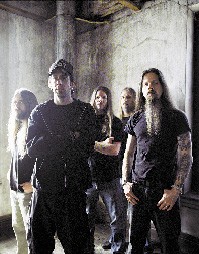The Final Solutions are celebrating the release of their second full-length album, which marks the latest chapter in the surprising story of what is, at this writing, Memphis’ best punk-rock band.
Named after the classic Pere Ubu song, the Solutions are an amalgam of local talent that avoids taking itself too seriously yet has emerged as an amazing live act with four singles and (now) two albums, both on Goner, under its belt. The cast is as follows: vocalist Zac Ives (co-owner of Goner Records), bassist Tommy Trouble (a high school honors English teacher by day), guitarist Justice Naczycz (leader of local hard-boogie enthusiasts Secret Service), and drummer Jay Reatard (you name it, but recently blowing minds with his solo album, Blood Visions).
For the sake of chronology, let us briefly travel back to the mid-’90s, when Ives, Trouble, and Naczycz were friends at Rhodes College. Those who paid close attention to show flyers or haunted Barrister’s during this period may remember a short-lived garage band by the name of the Jack Monkeys. “Tom was in a pop-punk band called Squirrels. They sounded like the Descendents or All, and Justice and I were in the Jack Monkeys with a drummer named Pete Nasty, who hadn’t played drums outside of the music room at Rhodes. We were really bad,” Ives says.
Reatard and Ives met at an Oblivians show when the former was in his mid-teens, and Ives began to give the future Reatard rides to shows. “During one of my last years at Rhodes, we put together a band for the talent show in the cafeteria and did Oblivians covers. That was one of the first times that Jay played drums,” Ives recalls.
Following graduation, Ives took a job in Washington, D.C. He returned to Memphis in 2000 to work for Archer Malmo and to eventually join Eric Friedl in the running of Goner Records. By this time, Trouble was teaching, Naczycz was following an acoustic singer-songwriter muse, and Reatard had retired the first version of his teen punk/garage band the Reatards to focus on the Lost Sounds.
“I started circulating compilation tapes of old Scandinavian punk rock,” Ives explains. “I’ve always been into the Television Personalities, especially the song ‘Part Time Punks,’ which I obsessed over for a while.”
Ives speaks loosely of the late-’70s/early-’80s “DIY” movement spearheaded by the likes of early Simple Minds, the Desperate Bicycles, the Homosexuals, and the aforementioned Television Personalities. The aesthetic was cheap, handmade packaging, marginal playing ability, and a turn away from the careerist direction that higher-profile punk rock had taken.
The four Memphians soon came together with Ohio transplant Quinn Powers on guitar (he was with the band for just over a year) and started making a mess of local club stages. “Our shortest show was probably one song, but we don’t really like to do that,” Ives says. “We want to put on a good show for everyone.”
Band activity ebbed and flowed over the next five or so years, resulting in a respectable discography and a much-talked-about live show.
Whereas the first Final Solutions LP was a mishmash of material, recorded at different stages in different places and pulled together to fill out an album, the new Songs by Solutions was a conscious effort. “We were writing for an album on this one,” Ives says. Recorded entirely by Reatard, Songs shows a band growing, even if they’re growing in a weird way to allow for the primary concerns of each member. “Reatard’s gotten extremely good at recording and knows exactly how he wants everything to come out,” Ives explains.
Everything came out nicely, albeit in very short, buzzsaw bursts of catchy aggro-pop. “Mental Shark Bite” and “Tammy” start things off in now-standard Solutions style, with repeated, almost spoken hooks, anthemic howls, smashed drums, and jagged or furiously strummed guitar. The minimal “I’m a Lightning Bug” sounds like pop music from an alternate universe that never experienced pop music, and the astonishingly long “Little Man in My Mind” clocks in at a whopping four-and-a-half minutes, which is like the Final Solutions doing Rush’s “2112.” (Not really, but you get the point.)
“Our songs are written in practice. One of us will bring in something, and everyone else will just work on top of that,” Ives says. “Tommy is responsible for most of the songs on Songs by Solutions. He’d just bring in a riff, and Justice would lay some guitar on top. Things would go from there.”
When asked about how pop and catchiness play into it all, Ives explains, “I have to have a hook. I can’t stand it when a singer is yelling at me.” Songs by Solutions is undoubtedly hummable in its frantic fury.
Fans of incendiary, unpredictable performances and bands who deliver without taking themselves too seriously are encouraged to witness just how far the Final Solutions have come.
